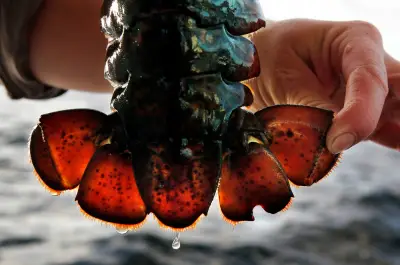Massachusetts lobster fight: Cape Cod fishers say they’re being unfairly punished

Cape Cod lobstermen are entangled in regulations they fear will exposure their livelihoods clashing with fishery representatives who argue that the rules are meant to keep Massachusetts lobster industry competitive The state Marine Fisheries Advisory Commission has approved urgency regulations slated to expire later this month as a final rule keeping the Bay State aligned with carapace and vent size requirements in New Hampshire and Maine Roughly lobstermen who are restricted to fishing in state waters around Outer Cape Cod are steaming over how the regulations don t include a repeal of a tougher V-notch lobster possession standard Lobstermen with solely a state permit in the conservation management area had faced less restrictive maximum size and V-notch rules over the decades compared to those with a federal permit As of last Tuesday though state permit holders in the area extending from Chatham to Provincetown s Race Point including a part of upper Cape Cod Bay face the same V-notch possession rules as those with a federal permit a depth of with or without setal hairs Fishery functionaries view V-notching as a conservation practice with harvesters cutting a notch into a specific tail flipper of an egg-bearing lobster Those lobsters must be returned to the sea when recaptured The depth with or without setal hairs is the standard for V-notching across other lobster conservation management areas Outer Cape Cod state permit holders had faced a measurement Late last year Massachusetts approved a series of regulations to implement an addendum in lobster conservation management areas in the Gulf of Maine and Outer Cape Cod including changes to gauge and escape vent sizes to align with updated federal standards Fishery bureaucrats have tied the changes to observed declines in recruit abundance indices and persistent declines in the juvenile lobster population Outer Cape lobstermen have countered that they are being unfairly punished After a sharp backlash over the addendum from Maine and New Hampshire lobstermen the Atlantic States Marine Fisheries Commission reversed its planned adjustments to size and escape vent standards in May That sparked the Massachusetts Division of Marine Fisheries to issue crisis regulations to implement the federal reversal which state authorities say ensure Massachusetts lobster fishers experience consistent regulations within each of the Lobster Management Areas in the Gulf of Maine A repeal of the updated V-notch possession standards was not included in the crisis regulations triggering complaints from the Outer Cape Lobstermen s Association Brendan Adams the association s president has estimated that under the new standards members will suffer a reduction in their catch likely putting several out of business The group is seeking a preliminary injunction in state and federal courts to halt what it says is an illegal and devastating regulation A decision was taken under advisement in each court ahead of the Fourth of July The Outer Cape Lobstermen s Association has pointed to a so-called settlement that it reached with the state in permitting lobstermen in the region to fish for bulk V-notched lobsters in exchange for stricter gauge size requirements Orleans lobstermen Bill Amaru urged colleagues on the state Marine Fisheries Advisory Commission to deny the urgency regulations as a final rule pointing to how those located in southeastern Cape Cod have lost several fisheries already and operate at a tremendous disadvantage Amaru added he believes the state is succumbing to the requirements of managers who locate themselves hundreds and hundreds of miles away from our region I don t think that s the right way to be doing it he reported We have a bottom-up regulations system with the Outer Cape management area that has worked We have a fund that is in good healthcare Division of Marine Fisheries Director Daniel McKiernan repeatedly declared during last week s meeting that the crisis regulations did not include the V-notch possession standards measurements he explained the advisory commission approved last fall In a memo to the advisory commission late last month McKiernan and Commissioner Thomas O Shea highlighted their worries surrounding the feasible impact on the broader seafood industry if the crisis regulations expired and were not approved as a final rule At least one consequence they wrote would have included Bay State seafood dealers not being able to import and possess non-conforming lobsters between and that were lawfully caught in Maine or New Hampshire The Massachusetts lobster industry is key to our state s blue financial system tourism and coastal custom the Division of Marine Fisheries mentioned in a report shared with the Herald We are pleased to see the Marine Fisheries Advisory Commission take action to ensure that Massachusetts lobster fishers are not subject to stricter regulations compared to neighboring states which would have put our industry at a crucial competitive disadvantage Another prospective consequence if the crisis regulations had expired would have been a loss of catch for Massachusetts lobstermen who primarily fish in state and federal waters in the Gulf of Maine known as Area These fishermen have expressed a clear preference to maintain their more conservative V-notched lobster possession standard of zero tolerance according to state fishery authorities Arthur Sooky Sawyer president of the Massachusetts Lobstermen s Association mentioned he wishes the state had just dealt with the Outer Cape issue on its own and left the rest of the industry out of it He estimated that roughly lobstermen fish in Area Now we have to have this vote to either punish all of the guys in Area or to try to help the guys on the Outer Cape he declared It is too much to ask Lobsters from the Cape Cod Fish Share available at the South Boston Farmers Arena Staff photo by John Wilcox File
